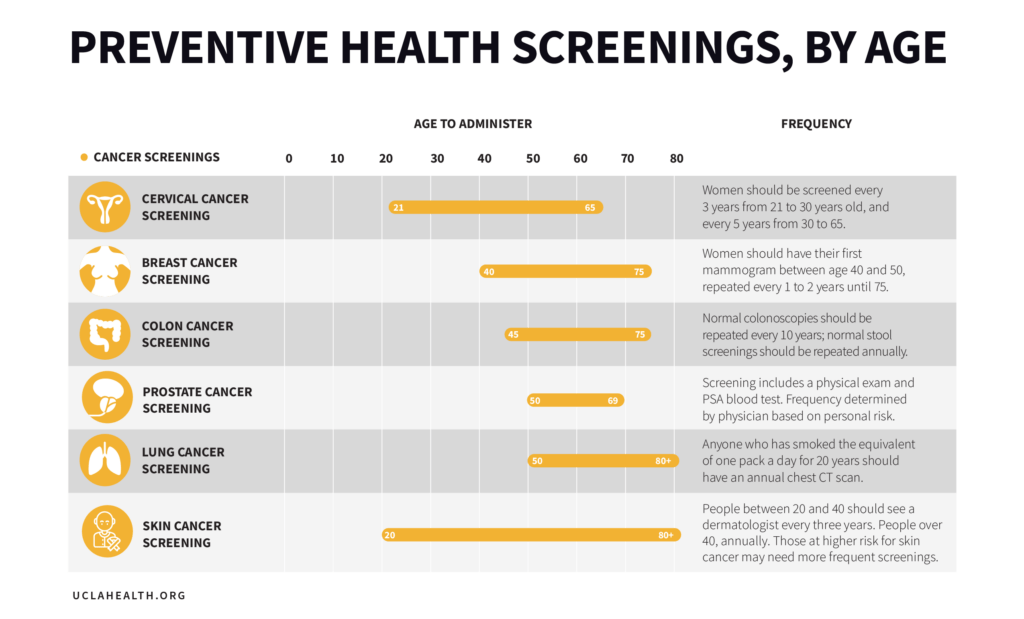
Cancer Screenings by the Numbers—and Why YOU Should Get One Too
Oncology research tells us, again and again, that early detection saves lives. Screenings help doctors detect the presence or risk of cancer, and the sooner it’s caught, the sooner treatment can start. The sooner the treatment, the better the outcome and higher the chance of recovery.
No matter who you are or how old you are—the American Cancer Society boldly states there are two actions you can take to greatly reduce your risk of developing and dying from the most common types of cancer in the United States:
- 1. Make every effort to reduce the harmful everyday habits that are known to increase the risk of developing cancer.
- 2. Follow the guidelines for recommended cancer screenings.
As a quick, yet helpful side note: In 2023 alone, 45% of the 609,820 cancer deaths that were estimated to occur in the United States were expected to be attributable to risk factors that are potentially modifiable. Here is a list of common habits that can be modified to help prevent the occurrence of cancer.
- Cigarette smoking
- Secondhand smoke exposure
- Excess body weight
- Alcohol intake
- Unhealthy diet
- Physical inactivity
- Ultraviolet radiation exposure
- Cancer-associated infections
The remainder of this blog focuses on recommended cancer screenings—for whom, at what age, how often, and for which type of cancer. Read on to learn more. It could possibly save your life or the life of your loved one.
What Are “Screenings” and Why Are They Important?
A “screening” involves a physical exam of some kind and often the additional use of bloodwork, imaging, or another form of testing. Screening also means checking the body for cancer before there are any symptoms.
Sign up to get the latest industry news and offers right in your inbox
For some types of cancer, specific self-checks are recommended—such as monthly breast exams that can be done at home on one’s own. Still, mammograms are the best way to find breast cancer early because it can catch cells before they are large enough to feel or cause symptoms.
A recent study of participants aged 50 estimated that 10,179 deaths from breast cancer, 27,166 from cervical cancer, and 74,740 from colorectal cancer could be prevented if current screening levels were maintained. In addition, an extra 1,300 deaths from breast cancer, 3,400 from cervical cancer, and 11,000 from colorectal cancer could be averted with an increase of 10 percentage points above current screening rates.
Learning more about different types of screenings and what they entail is a smart step toward scheduling an appointment.
A Few Reasons People Don’t Get Cancer Screenings
Even with the obvious benefits of early-detection screenings, the number of cancer screenings is less than optimal. Recommendations are not being heard, or heeded.
A 2022 medical report stated that the median prevalence of women aged 50 to 74 years old who had a mammogram within the past 2 years was about 78%. However, in 2020 approximately 20% of women aged 21 to 65 years had not been screened for cervical cancer in the past 3 years. Finally, the national median of people aged 50 to 75 years who had been screened for colorectal cancer per recommendations remained at less than 70%.
Unfortunately, these percentages vary widely—with statistics for minorities, women with lower education levels and household income, and women with less access to healthcare more than 10 points below than the national average.
Other factors that affect whether people access cancer screening services include screening costs, lack of health insurance, travel distance to and location of screening sites, knowledge of the disease and of disease prevention, and patient and clinician attitudes.
What Type of Cancer Screening Should I Get? And When?
We’re glad you asked. Refer to the following infographic for detailed information about the most common cancer screenings, who they’re for, and when they should be done.

Source: UCLA Health
![]()
Healthcare Professionals: Here to Help Prevent Cancer and Treat Cancer
The entire month of March is recognized as National Colorectal Cancer Awareness Month; this is the second deadliest cancer in the United States and one of the few cancers that is preventable with proper screening.
Did you know that March 30, 2024, is National Doctors Day in the United States? No, it’s not a holiday or a day off, but a day to recognize all the effort and time physicians dedicate to patients. Healthcare providers, oncologists, and medical staff work tirelessly to help prevent and treat cancer.
Champion is here to provide the very best in medical seating for patients who are undergoing infusion treatments, which can be long and discomforting. Learn more about our premium Alō Collection, and click here to request a free demo or quote.
